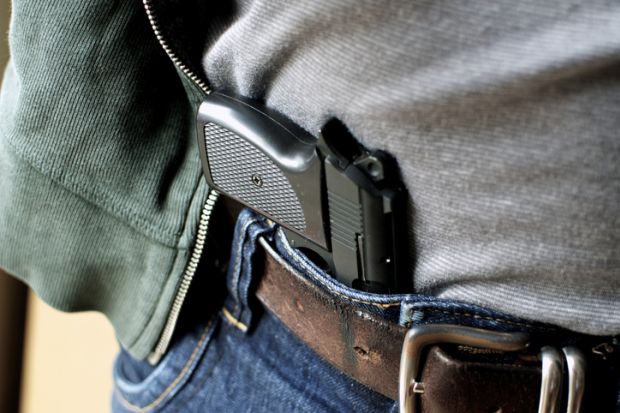US public universities are fighting new attempts to allow guns on campuses, with conservative state lawmakers undeterred by limited research data and clear opposition from institutional leaders.
The most recent instance involves West Virginia, where the state senate voted 29-4 in favour of legislation to let people bring firearms on to college and university campuses, despite pleas from state university leaders. The bill heads next to the state legislature’s other chamber, the House of Delegates, which is also overwhelmingly dominated by Republicans.
The US already has about a dozen states that permit guns on college campuses, with lawmakers in several others already trying or expected to pursue the idea this year, according to the activist group Campaign to Keep Guns Off Campus.
“The gun lobby is trying to find as many places as possible where people can carry,” said the organisation’s executive director, Andy Pelosi.
In West Virginia, the presidents of the state’s two largest higher education institutions, West Virginia University and Marshall University, wrote to the lawmakers urging them not to pass the bill.
Governing boards “are best suited to decide whether guns should be permitted on campus”, Gordon Gee and Brad Smith told senators.
West Virginia University’s faculty senate also approved a resolution opposing the bill.
States that already allow guns on the campuses of their public colleges and universities include Arkansas, Colorado, Georgia, Idaho, Kansas, Mississippi, Montana, Oregon, Tennessee, Texas, Utah and Wisconsin.
New York lawmakers are being asked to join them, despite the state’s Democratic majority, while more plausible campaigns appear possible this year in several other states, including Iowa, Kentucky, Nebraska, North Dakota, South Carolina and South Dakota. Idaho lawmakers are considering legislation that would stop colleges putting limits on where guns can be carried.
The fatal shootings last May of 19 students and two teachers at an elementary school in Uvalde, Texas, seems to have sparked an increase in political interest in allowing guns in educational settings, said Cheryl Jonson, associate professor of criminal justice at Ohio’s Xavier University.
Last year, gun control campaigners in Arizona managed a narrow victory against a bill to permit weapons on campuses, and the state’s change this year to a Democratic governor solidifies that win, Mr Pelosi said.
While the university presidents in West Virginia have fought back, their colleagues in other states are sometimes more reluctant, Mr Pelosi said, given their fear of antagonising politicians responsible for controlling their budgets and policies.
Another challenge, Mr Pelosi acknowledged, was the relative lack of research data specific to the cases of college campuses. There is plentiful research evidence showing that more guns in society lead to more violence and death, and some studies that link guns to increased crime on campuses, he said. But findings specific to college settings are limited by the fact that most states that allow guns on campuses do not track how many people actually carry them, he said.
But overall, Mr Pelosi’s group and others point out that in a nation with more than 40,000 gun deaths per year, university campuses are already among the safest places to be. And there’s no clear evidence – despite West Virginia lawmakers pushing their “Campus Self-Defense Act” on the grounds that it will help women deter sexual violence – that guns make a college campus safer, Mr Pelosi said. Women’s advocacy groups instead are among numerous campus constituencies especially opposed to such laws, he said, fearing that gun permissiveness will help arm their potential attackers.






